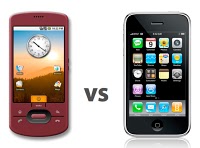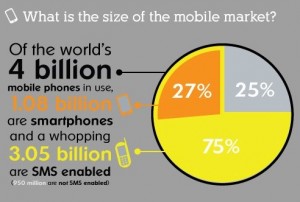There is so much good info online, I thought I would share a few of the interesting things I’ve been reading.
Android smartphones are more popular than iPhone in the UK
Research was commissioned by a digital banking provider, Intelligent Environments.
They found that 28% of smartphone users in the UK own an Android or Windows based phone, 26% an Apple iPhone and only 14% a BlackBerry. So my question is, of those Android users, I wonder how many are Nokia, Samsung, HTC or Motorola? It is incredible how much the mobile market has been shaken up by the emergence of the iPhone and Google’s Android providers. But that’s a completely different topic. Back to the research.
Some other interesting stats they noted were (bare in mind these are UK figures):
- Android users are most likely to spend time mapping and planning travel – 34% rate this in the top three “apps” they spend the most time using, compared with BlackBerry and Apple (both 28%).
- iPhone customers are the heaviest smartphone users – 18% spend more than four hours on their phone each day, compared with just 4% of Android and BlackBerry users.
- Some 63% of iPhone users rank social networking and 48% games in their top three apps.
- Nearly one fifth (18%) admit that their main bank account is always overdrawn, compared with an average 12% of all Britons.
Why mobile matters – for marketers
Boagworld is also able to articulate, very simple, why mobile matters to the marketing mix:
- It is predicted that the number of people accessing the web via mobile devices will surpass the number accessing via desktop users by 2014
- Already mobile smartphone internet usage is proving to be huge for local search with 50% of mobile searches containing results for local search
- The most interesting fact to me was that women aged 35-50 are the most active in mobile socialising. I work for WWF and as a charity, women of this age are our donor heartland. Mobile internet and search means good things for charities
- There are 4 Billion mobile users and already 1.8 Billion use smartphones.
David Rowan (editor of Wired magazine UK) makes some strong statements that mobile will make us millions – if we have a good idea
The mobile internet is undergoing such unprecedented growth today that anyone with a smart, relevant idea has a head start in building a profitable mobile business.
Rowan says, “The money won’t be in smartphone apps. It’s in reaching the billions who simply want to be connected, whether by SMS or old-fashioned services such as WAP.”
Morgan Stanley says that the growth curve for mobile internet is around 12 times as steep as that for the desktop internet when it rolled out — and we all know how transformative that was. The speed of mobile-internet take-up, says Morgan Stanley, is a revolution “the likes of which we haven’t seen before”.
According to Finnish mobile-industry consultant Tomi Ahonen, the money won’t be in smartphone apps. Apps generate tiny revenue compared with more traditional text-messaging and multimedia-messaging services. In 2010, we sent something like 6,100,000,000,000 text messages — that’s 200,000 every second. With 4.2 billion active SMS users, think of a service that can persuade just a million or two of them to pay you a few pennies. You can deliver everything from horoscopes to airline tickets to cash with SMS. Old-school, but proven.
And this is my favourite little wrap up, “the world’s richest man is no longer Bill Gates. It’s Carlos Slim — who made his fortune in the mobile industry. And he won’t be the last.”
As you can see, I’ve absolutely just stolen information from these excellent sources, but its not plaguerism, its spreading the good word.
Do you think mobile internet will, or has, changed the world for marketers, or just changed the way we, as humans, communicate?



Trackbacks/Pingbacks